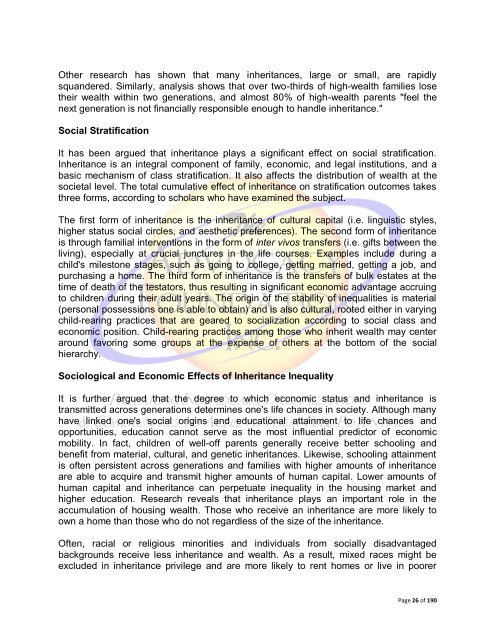Wills, Trusts & Estates
Wills, Trusts & Estates
Wills, Trusts & Estates
Create successful ePaper yourself
Turn your PDF publications into a flip-book with our unique Google optimized e-Paper software.
Other research has shown that many inheritances, large or small, are rapidly<br />
squandered. Similarly, analysis shows that over two-thirds of high-wealth families lose<br />
their wealth within two generations, and almost 80% of high-wealth parents "feel the<br />
next generation is not financially responsible enough to handle inheritance."<br />
Social Stratification<br />
It has been argued that inheritance plays a significant effect on social stratification.<br />
Inheritance is an integral component of family, economic, and legal institutions, and a<br />
basic mechanism of class stratification. It also affects the distribution of wealth at the<br />
societal level. The total cumulative effect of inheritance on stratification outcomes takes<br />
three forms, according to scholars who have examined the subject.<br />
The first form of inheritance is the inheritance of cultural capital (i.e. linguistic styles,<br />
higher status social circles, and aesthetic preferences). The second form of inheritance<br />
is through familial interventions in the form of inter vivos transfers (i.e. gifts between the<br />
living), especially at crucial junctures in the life courses. Ex<strong>amp</strong>les include during a<br />
child's milestone stages, such as going to college, getting married, getting a job, and<br />
purchasing a home. The third form of inheritance is the transfers of bulk estates at the<br />
time of death of the testators, thus resulting in significant economic advantage accruing<br />
to children during their adult years. The origin of the stability of inequalities is material<br />
(personal possessions one is able to obtain) and is also cultural, rooted either in varying<br />
child-rearing practices that are geared to socialization according to social class and<br />
economic position. Child-rearing practices among those who inherit wealth may center<br />
around favoring some groups at the expense of others at the bottom of the social<br />
hierarchy.<br />
Sociological and Economic Effects of Inheritance Inequality<br />
It is further argued that the degree to which economic status and inheritance is<br />
transmitted across generations determines one's life chances in society. Although many<br />
have linked one's social origins and educational attainment to life chances and<br />
opportunities, education cannot serve as the most influential predictor of economic<br />
mobility. In fact, children of well-off parents generally receive better schooling and<br />
benefit from material, cultural, and genetic inheritances. Likewise, schooling attainment<br />
is often persistent across generations and families with higher amounts of inheritance<br />
are able to acquire and transmit higher amounts of human capital. Lower amounts of<br />
human capital and inheritance can perpetuate inequality in the housing market and<br />
higher education. Research reveals that inheritance plays an important role in the<br />
accumulation of housing wealth. Those who receive an inheritance are more likely to<br />
own a home than those who do not regardless of the size of the inheritance.<br />
Often, racial or religious minorities and individuals from socially disadvantaged<br />
backgrounds receive less inheritance and wealth. As a result, mixed races might be<br />
excluded in inheritance privilege and are more likely to rent homes or live in poorer<br />
Page 26 of 190

















